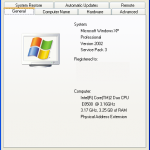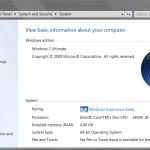The Windows 7 64-Bit Question: Should I Switch?
Windows 7 is almost upon us, and by all accounts, it’s one of the rare instances where Microsoft actually get things right (XP being the other one). The question I’ve been seeing a lot of, and it’s also one that I myself have asked when I got my new computer last year, is should I keep on using a 32-bit OS or a 64-bit one?
First of all, a little background on the issue. 32-bit computing has been with us for quite a while now, ever since Windows 3.11 and 95. But what does it all mean? Well, a 32-bit OS is one that can work with 32-bit chunks of data in a single operation. Accuracy of data, particularly decimal values, also increase as the number of bits increase – a 64-bit system can represent a decimal value up to 14 significant numbers, whereas a 32-bit system, can only go up to 7.
The bit rating also determines how much memory the system can support, as each byte of memory will require their own address location. With 32-bit computing, up to 2 ^ 32, or 4,294,967,296 different locations can be addressed. 4,294,967,296 bytes work out to be 4 GB. But if you need to add more memory to your system, then you have reached the limit of 32-bit systems the extra memory will simply be ignored. You will actually get less than 4 GB of memory being available in Windows if you are using the 32-bit version, as other devices with memory, such as your graphics card (which can come with 1 GB+ of memory these days) will also use up the available addressing space. This is why it’s common to see only 3.2 GB or less on 32-bit Windows with 4 GB of memory. But with a 64-bit OS, you now have 2 ^ 64 address locations to work with, and this means support for up to 16 Exabytes of memory (1 Exabyte equals 1,073,741,824 GBs)! We’ll probably colonize Mars before we’ll need a computer with that much memory.
In order to use a 64-bit OS, there are a couple of requirements. First of all, your CPU must be 64-bit compatible. Luckily, most CPUs these days are. AMD’s Athlon 64 makes this clear in its naming, and practically any Intel CPU released since 2005 (including some Prescott P4’s, and everything after the Pentium D). And obviously, you need a 64-bit OS. And then in terms of software, you’ll need 64-bit drivers for your various devices. All 32-bit applications will still run perfectly fine in a 64-bit OS (that’s because even though most of you are running a 32-bit OS, you’re actually already using a 64-bit CPU, and so you’ll already taking advantage the 32-bit compatibility that 64-bit processors offer). 16-bit software won’t be supported at all though, but it’s unlikely they will run in Windows, even the 32-bit version – but you can still use DOSBox to run these programs in 64-bit Windows.
Upgrading to Windows 7, particularly doing a clean install as many will be doing, is an excellent opportunity to upgrade from 32-bit to 64-bit. And you do almost always need to do a clean install in order to make such an upgrade. The rest of this article will examine the benefits, and some of the drawbacks, of upgrading from 32-bit to 64-bit so that when you do make the decision to go with Windows 7, you can make the right decision. Note that the retail DVD disc of Windows 7 will come with both 32-bit and 64-bit editions, and if you need to go from one to another, you’ll have to to a clean install. If you are buying the OEM version or if you system comes with one, then the product key is usually limited to either the 32-bit or the 64-bit version, and you normally cannot go from one to the other without buying another set of keys (although your system manufacturer might be nice enough to exchange product keys for you).
Performance:
While in theory, the CPU’s ability to process 64-bit chunks of data, as opposed to only 32-bits, should provide a performance boost. In reality, thanks to processor extensions such as SSE4, the CPU is already capable of processing data in ever larger chunks, some 128-bit wide. The ability to take advantage of 64-bit processing also depends on the type of software. Software that performs lots of calculations, especially of larger numbers, and software that deals digital video, encryption, large databases will all benefit. Of course, these software will have to have 64-bit support, but that’s becoming much more common these days (K-Lite Codec Pack, ffdshow, x264, VirtualDub and Media Player Classic are just a small selection of software on Digital Digest that already have 64-bit editions). And of course, because 64-bit systems can support more memory, any application for which 4 GB is simply not enough will definitely benefit from 64-bit systems. But for general home use, there is very little noticeable difference between 32-bit and 64-bit computing, at least for now.
32 or 64: 64-bit has performance gains, albeit mostly theoretical or fairly insignificant. You certainly won’t be worse off with a 64-bit OS, so there’s no harm in being future proof.
Compatibility:
As mentioned above, compatibility is much less of an issue than a couple of years ago, since new CPUs are 64-bit these days. Driver support is also much better, particularly with the large vendors, and a quick browse of their driver section reveals 64-bit drivers ready for Windows 7 even right now. The only problem is with smaller vendors and legacy hardware, for example, a no brand scanner from 2004. Unless the manufacturer of this device was considerable enough to continue to provide driver updates (unlikely), or that Windows has native support, then you may be out of luck. Note that 64-bit Windows requires all drivers to have electronic signatures, and it won’t allow drivers without them to be installed – this brings improved security, but it also means custom drivers are out of the question and that you have to rely further on the manufacturer to provide signed drivers.
32 or 64: 32-bit will definitely be more compatible, but unless you can’t live without a particular legacy device, it shouldn’t be an issue for most people.
Extra Memory Support:
On the surface, being able to use more than 4 GB of memory sounds like it will be quite handy, as 2 GB is quickly become even standard on budget systems. And even if you use exactly 4 GB of memory, being able to use all of it, instead of just 3.2 GB of it, is also a good idea. But in reality, at least with today’s applications, the extra memory will not bring you a huge performance increase, and in fact, the performance benefits of even going from 2 GB to 4 GB is debatable. With Core i7’s triple channel memory support, getting 3 GB of memory so that you don’t waste the extra GB in a 32-bit OS is also a possibility.
32 or 64: A 64-bit OS will allow you to use the full amount of your 4 GB of memory, and allow you to upgrade to more when needed. But whether you will actually need more than 4 GB of memory is debatable. But as with performance, you have nothing to lose by going 64-bit now, even if you don’t need it right away.
Conclusion:
So the conclusion may be that while 64-bit is the future, going to a 64-bit OS won’t give you a huge amount of benefits right now. But unlike the early days of 64-bit computing, with missing drivers and patchy software support, these are all relatively non issues and you really have nothing to lose from going 64-bit. The increased performance from a small set of specialized tasks, the improved memory support and even some security enhancements means that the benefits just about outweigh the risks. And the benefits will keep on increasing, while the risk keep on decreasing over time as well. Of course, if you get the retail version of Windows 7, you can always stick with 32-bit for now and do a clean install sometime in the future when you need 64-bit.
But one thing is for sure, 32-bit computing is nearing an end. With CPUs already having moved on, driver support mostly in place, and the memory limit becoming an issue, Windows 7 will most likely be the last ever 32-bit Windows and it’s only a matter of time before we’ll all using 64-bit operating systems.



September 27th, 2009 at 9:54 pm
[…] DVDGuy’s Blog @ Digital Digest Just what the world needs, another blog « The Windows 7 64-Bit Question: Should I Switch? […]